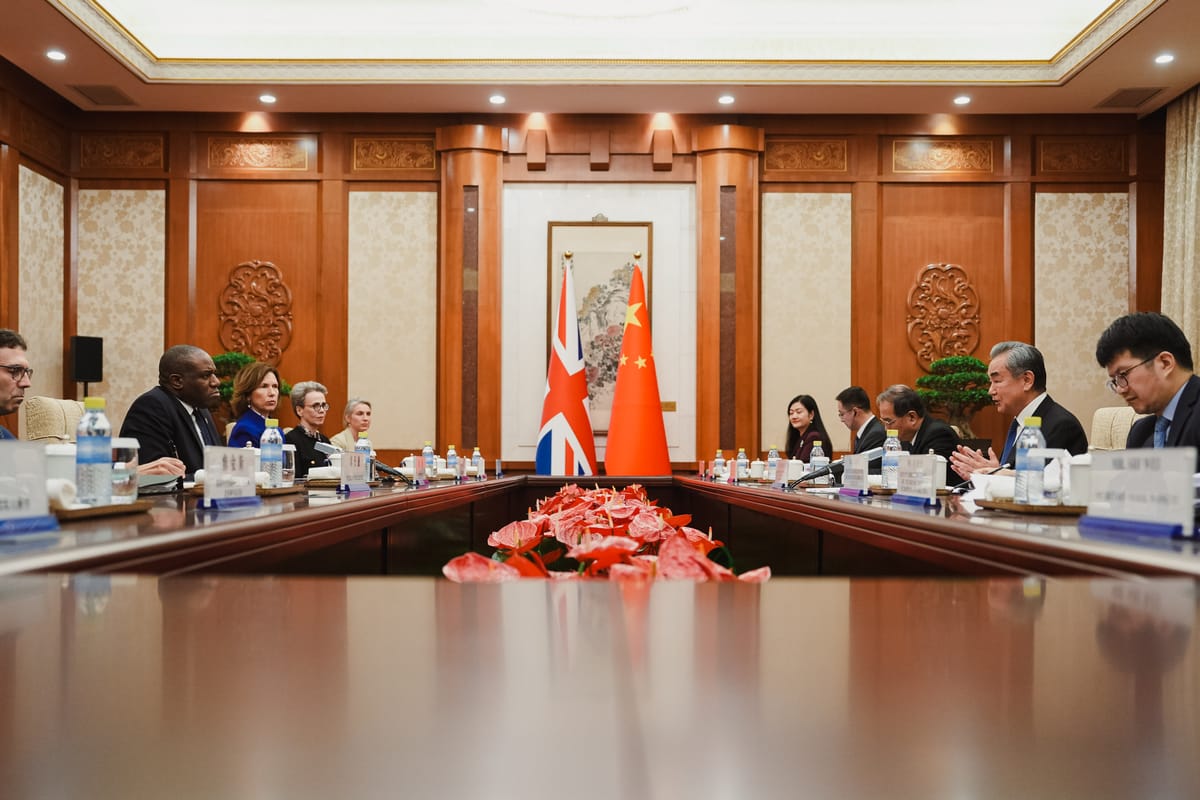A Wavering "Special Relationship"

The United Kingdom’s foreign policy has long been informed by its “special relationship” with the United States. This close alignment is particularly evident in the U.K.’s role in the ongoing Middle East conflicts, with the United Kingdom allowing American forces to use its bases when supplying aid to Israel, providing intelligence to intercept attacks to Israel from Iran, and so forth. However, more than a year after the Oct. 7 attack by Hamas on Israeli civilians, developments in the U.K. suggest a divergence towards a more flexible foreign policy unconfined by the U.S., prompting a reevaluation of one of the world’s longest-standing and closest bilateral relationships, one that has persisted for centuries.
The U.S.-U.K. alliance is built on a shared foundation of ethnicity, democratic values, and history, preserved through the consistent exchange of mutually beneficial interests. According to an analysis by former American diplomat Charles A. Ray, the United States leverages the U.K.’s historical ties and intelligence networks in countries where the United States lacks influence, while the United Kingdom enjoys easier access to the US defense, technical intelligence, and policymakers. As a result, when the United States needs a helping hand in foreign affairs, the United Kingdom has been a prominent ally, providing military aid in the 2003 Iraq war despite a domestic backlash and, more currently, providing backing to Israel through its closer proximity to the Israeli-Palestinian conflict.
On the other hand, the United Kingdom depends on the United States to maintain its global power status. While the U.K. remains a major power in global influence and strength, it is far behind the top three most powerful countries: the United States, China, and Russia. Moreover, the U.K.’s departure from the European Union (known as Brexit) further weakened its global standing, so to maintain its status, the country has been keen to maintain strong ties with a leading superpower, thus often conforming to U.S. interests despite consequent constraints on U.K. foreign policy.
While the United Kingdom and the United States align in their support for Israel in the Palestine-Israel war, the nature of their involvement in the ongoing conflicts shows how their stakes in the region have crucial differences. Both countries have powerful Israel lobbies: Conservative Friends of Israel counts 80% of British Conservative MPs as members, and pro-Israel groups in the U.S., such as the largest and oldest such organization, the American Israel Public Affairs Committee, have intensified lobbying and financial contributions since the Gaza war, thus influencing foreign policy. Both nations’ histories with Israel are intertwined, dating back to the Cold War when Israel served as a symbol of democracy in the Middle East against the communist Soviet influence in neighboring Arab countries.
However, despite these common factors, the United States has more to lose as conflicts in the Middle East continue because its strategic interests in the region are critical to preserving its global dominance. Israel provides crucial and direct access to the Middle East for intelligence gathering, establishing a military presence and the ability to reap the economic benefits of its natural resources. Additionally, U.S. support for Israel has been further reinforced by concerns over Middle East terrorists since the September 11 attacks, the threat of a nuclear-armed Iran, and the Middle East’s growing global importance.
Unlike past conflicts that were relatively short and resulted in victories for Israel, the current war, fueled by brewing resentment from Israel’s neighbors in the Middle East, has dragged on for over a year, leaving Israel unable to sustain itself and heavily dependent on American support militarily. The U.S.’s greatest concern, should a two-state solution actually emerge, is that Israel’s Arab neighbors will band together against Israel and its allies. The U.S. could lose critical leverage in the Middle East should Palestine gain autonomy to operate and serve as a counterbalance to Israel, enabling the opportunity for competing superpowers Russia and China to take up U.S. influence over the region’s Arab countries.
The U.K., on the other hand, while principally attached to Israel as America’s ally, doesn’t have the U.S.’s position to maintain, and thus has more room to criticize or push back against Israel’s actions. Under former Prime Minister David Cameron, who was appointed to serve as Foreign Secretary in 2023 and served until the Conservatives lost power in July 2024, the U.K. had reinvigorated diplomatic engagement in the Middle East, especially towards Israel and Palestine. In contrast to the U.K.’s consensus support of Israel’s right to self-defense — the current policy — Cameron advocated for more humanitarian aid to Gaza and for recognition of Palestine as a state in order to broker a potential peace deal in light of the escalating violence and bloodshed. He declared that support for Israel “is not unconditional,” pointing to the country’s violations of international humanitarian laws. In September 2024, some of these sentiments were realized as the U.K. suspended arms sales to Israel because of the risks of violating humanitarian law.
More subtly, the U.K. has begun to recognize the U.S.’s unstable status as the dominant global power. The U.S. is stuck, according to Karen DeYoung and Missy Ryan, writing in The Washington Post, embroiled in a proxy war in Israel, reluctant to deepen involvement, yet unable to withdraw as the conflict drags on with deep-rooted and unresolvable animosities on both sides. While the U.K. does not have the capacity to completely change sides at the moment, the U.S.’s struggles and decreasing ability to keep allies in check signals to the U.K. that a shift in alliances may be something to consider further down the line.
As a result, their eyes are starting to wander to the Far East. Though the U.S. remains far from collapsing, the U.K. has strategically been working to repair damaged ties with China. In October, British Foreign Secretary David Lammy made a rare visit to China — the second in six years among top UK diplomats — to meet and deliberate with Chinese Foreign Minister Wang Yi over the first steps to rebuild economic and diplomatic relations between the two countries. Given China’s growing influence in foreign affairs and increasing economic power, it presents a viable alternative for the U.K. to offset its traditional reliance on the U.S. In other words, the U.K. is hedging its bets.
Even with the recent calls for change in Israel policy, the U.K. remains a weaker country post-Brexit. Its ability to independently back Israel has even been called into question, given the U.K.’s weakened military, manpower shortages, and inferior technology. Moreover, the U.K. lacks a clear enough justification to break away from the U.S., whose foreign policy still has a hold on the U.K. For instance, Cameron’s diplomatic efforts during his term to de-escalate the Israel-Palestine conflict may have been an attempt to ease the burden on the U.S., although his actions were hindered by the U.K.’s limited resources and funding cuts to foreign aid. In reality, the U.K. lacks the resources and power to assert itself on the global stage, resulting in its strategy to play “second fiddle” to whoever is on top to maintain its power.
While it may seem to be a reactive or even an opportunistic approach, it is the most pragmatic one for the U.K. in the long run. The U.K. simply lacks the economic and political strength to be a superpower independently and thus needs to tie itself to a larger force to remain relevant. Whether their future involves an alliance with the U.S. or another rising power, like China, is still up in the air. Considering all these possibilities, moving forward, U.K. foreign policy must focus on keeping diplomatic options open and preparing for a potential fork in the road, acknowledging that its alignment with the U.S. may no longer be a constant.



